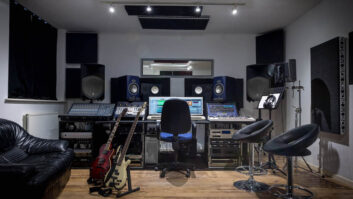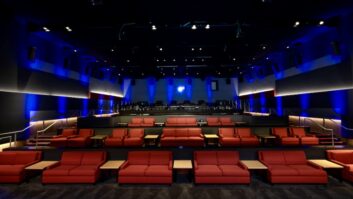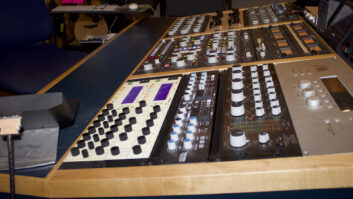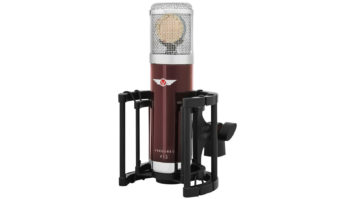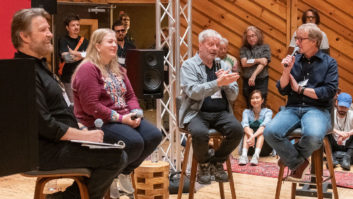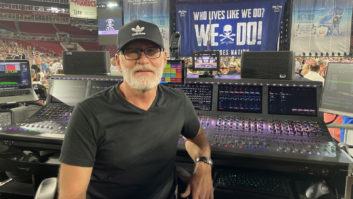Cenzo Townshend’s rolling Electric Landlady Studio can be set up wherever a client wishes.
Today’s lean-and-mean studio economy is a scary world for freelance audio engineers — even for established mixers who in the past had little trouble finding work. Nowadays, as budgets droop and D.I.Y. is often the order of the day, once-busy audio pros have to find new avenues to the dollar. No, the major bookings are not going away; there will always be a need and budget for big sessions. But large-scale studio sessions are fewer and far between, replaced by freeze-dried tracks in production and the abundance of home studios powered by inexpensive and ever-better — sounding gear.
When the phone’s not ringing, how do engineers respond? By becoming more versatile than ever, which means expanding their areas of expertise and, perhaps even more importantly, broadening their focus. One answer is to become a full-service solution for their clients. Being a jack-of-all-trades is the way to attract more work. New technology powered by the Internet gives professionals the ability to network, find clients, work and send files quickly and cheaply online. Some engineers have found that being a talent scout and taking on more of an A&R role has driven business. The bottom line is that versatility and a wide skill set are essential.
BRANCHING OUT
“I think that there are a lot of good people who aren’t working enough,” says Maureen Droney, executive director of the Recording Academy Producers & Engineers Wing. Droney finds that the key is for engineers to be more proactive in their search for work. “Now it’s becoming much more desirable for labels, with their shrunken A&R staffs, to rely on independent labels and producers to find talent,” she says. At the Recording Academy Pacific Northwest Studio Summit in Seattle, held in early March, engineers Mike Clink and Joe Chiccarelli spoke about their roles in developing talent; after the panel, they were out in clubs in search of bands of interest.
Shifting from label work to a more indie base has given others chances to stretch. “I’ve always wanted to do more work in production,” says Miami-based engineer/producer Charles Dye (Ricky Martin, Gloria Estefan), who has found that the drop in major-label work has prompted more opportunities for him to develop as a producer. “I was doing it in my spare time, even back in 1997, but still had to squeeze it in between engineering jobs; I didn’t have time to develop as a producer.” Now, Dye is able to develop bands that can benefit from his years of expertise, and he’s found the time to work on his skills. “When you’re focusing on a long project as a producer, you have time to develop.”
New York City — based engineer Dave O’Donnell (Eric Clapton, James Taylor, Herbie Hancock, Keb’ Mo’) started in 1984 at Power Station and has seen the business change drastically since then. For him, the clients have shifted since 2000, but work has been steady now that he’s opened his own mix room. “It’s mostly been label work, but there is independent stuff and I’ve also been doing independent production.”
Dave O’Donnell is getting a lot of long-distance work.
Droney, Dye and O’Donnell’s comments point to the fact that in all transitions from old to new business models, innovation is key. Necessity is the mother of invention after all, and when people are forced to be resourceful, they are usually at their best, especially creative professionals such as engineers and musicians. One trend emerging from this dilemma is that everyone who is working has some kind of mix or recording rig they can rent or offer to clients as part of their “package.” The truth is, if you want to work, then you’ve got to have a rig. As much as every engineer would like to work in a facility for an entire project, the budgets will not support it. And the one who can offer those same services, often folded into the cost that someone would have paid for an engineer or musician alone, will get the brass ring.
One of the more creative spins on this angle is Electric Landlady Studio, the brainchild of 20-year veteran engineer/producer Cenzo Townshend (New Order, Blur, U2, Echo & The Bunnymen, The Cranberries). Based out of the UK, the studio is a rolling production rig featuring an Audient ASP24 console; KRK monitors; 24-channel Neve sidecar; Neve 1066 and 1272, and Telefunken V72 preamps; a wide variety of outboard gear and effects; studio chairs; DI boxes; and mic stands and cables. The rig allows him to offer his services across the continent and gives clients the opportunity to work wherever they’d like.
Of course, as new opportunities arise, others fall with studios closing at a startling rate because of the downturn in budgets and the corresponding decrease in work for larger rooms. Just in the past six months, we’ve seen some major rooms in New York and L.A. close or, in the case of Sound on Sound and Right Track studios, merging their resources. On the upside, East West has moved into the space once occupied by Los Angeles’ Cello studios to have a space to expertly record their samples. Irony, indeed.
LONG-DISTANCE COLLABORATION
Many engineers have found new and unexpected opportunities through Internet technologies that allow quick and inexpensive communication and movement of data over long distances. O’Donnell has found that the Internet has allowed him to work with people he would not have had the opportunity to work with in the past. “I’m mixing a record now for clients that are in Europe,” he says. “They just send me the files, I mix it and send them an MP3 and they listen. I’ve never met these people, but they’re great to work with.” He finds that another factor is that the time pressure is not as frantic because the client is not paying a studio, but O’Donnell is quick to say that he values a traditional facility’s atmosphere and professionalism. “I still prefer to go to a great studio,” he says. “We definitely don’t want them to go away, because, really, it’s the best place to do everything.”
Dye has also found that long-distance work is part of his new mix of revenue. “There’s been a fair amount of long-distance projects,” he says. “It might be from someone in Australia, Germany, upstate New York or wherever.” For Dye, he’s found a way to work as if the client is right in the room, despite the far-away factor. “I’ve been using the [Source Elements] Source-Live plug-in in Pro Tools that allows you to stream directly from your Pro Tools session to anybody you’d like,” he says. This way, Dye bypasses the asynchronous process of bouncing a mix, converting it to MP3, putting it in an e-mail and then having the client download it and listen, often waiting for a reply for an hour or more. “With Source-Live, it’s as if they’re sitting on the couch.” As an interesting aside, Dye says the thing that’s most helped him get a good product at home is affordable acoustic treatment. “It used to be extremely expensive to treat your studio properly,” he explains. “But when the higher-end companies started to realize there was a new market, they created new lines of mid- to low-level — priced products that do a good job.”
ENTER THE MUSICIANS
Part of the shift in engineer work is due to the fact that musicians who once brought their instruments to the studio or soundstage are now recording themselves at home, and it’s not just direct input. Nashville drummer Tony Morra (www.downtownbatterie.com) decided to invest in his recording career by partnering with an engineer friend who helped him to dial in his room and buy the right gear. Since then, Morra has developed his engineering chops to expert status. “As more projects went into smaller rooms and the home studio situation, drums were the first thing to go. So work slowed quite a bit,” he says. Morra found that the reaction to him recording his own tracks wasn’t always positive, but that didn’t stop him from developing as an engineer. “Some engineers have flipped that a drummer is doing their gig. The reality for me is that if I want to stay ahead of the pack and earn an income as a player, it’s no longer just about playing drums; it’s about being a complete musician and a recording technician.”
Musician/engineer/producer Jeff Bova (R. Kelly, Backstreet Boys, Luther Vandross, Nick Lachey) moved from a longtime base of operations in New York to L.A., where he has opened his own room and is doing more and more engineering. “With programming moving more into the hands of each individual doing their own work, it started shifting out of the hands of the hired guns,” says Bova about his experience in New York and his reason for moving. Bova has a number of friends who have also relocated from New York to L.A. because the work is better. Like Morra, Bova has found that migrating into engineering is a natural outgrowth of the way production has evolved and a necessity if he wants to stay competitive. “Keyboards are where I started, then programming that led into arranging and then into production,” he says. “By virtue of working in Pro Tools, I’ve become an engineer.” Bova finds that most of his engineering work comes through artists he’s producing or clients who send him files through the Internet.
Musician/engineer Jeff Bova relocated and set up shop in L.A.
THE SILVER LINING
There are some conclusions we can draw from this, and they’re not all negative. If there is a big winner, it is the music. New bands and new musical opportunities are being born by the spirit of independence, and engineers are right there in the mix. “Independent artists aren’t really driven to be the next Linkin Park because it’s so hyper-unrealistic to think you’ll be them because even Linkin Park isn’t selling like they were five years ago,” muses Dye about what he sees evolving from the ashes of the downturn. “What I see happening is that the economy has shifted the creation of music back to the artist, and it’s now less about making a product and more about making music. The people who stick it out will be the ones who end up on top.”
Droney believes the recipe for success goes back to the same things that made engineers successful in the past. “I think that to be successful today takes what it took back in the ’50s and ’60s, when you had to have a real passion for what you did and you had to be tireless and proactive about it. In the ’80s or ’90s, there was a lot more leeway to get a project that had a big budget and stumble your way through it. There were a lot more records being thrown up against the wall and a lot of money out there. It’s much more like the early days in the actual fact of recording and breaking artists.”
ACROSS-THE-BOARD CHANGES
With all this shift in job focus, where does the newcomer fit in? Entry-level pros who are versatile and have a variety of skills will always be in demand. With so many home rigs, there is an expanding market for freelance troubleshooters and maintenance engineers. It’s not in the artist or producer’s best interest to be the jack-of-all-trades. As always, it’s about getting your foot in the door. In the old model, it was as a runner; in the new model, it might be a different gig, but it’s the same game. Starting at the bottom gets you access, and after that, your own ingenuity and dedication will decide your level of success.
As for the pro, it means hustling more, being proactive, offering a full-service package and even developing talent. It can also mean steering the client into a situation where, despite the conventional wisdom of doing it at home or on the cheap, the old tried-and-true simply works better. O’Donnell believes that for some projects, booking a big room can actually save money and make a better-sounding record. “Some clients think a big room is too expensive,” O’Donnell says. “Yes, it costs more, but you get it done quicker, stuff works, everybody’s happy and they play better.”
Whatever the situation, finding the elusive answer starts with possessing a broad body of expertise and new and innovative ways to apply it.
Kevin Becka is Mix’s technical editor.
